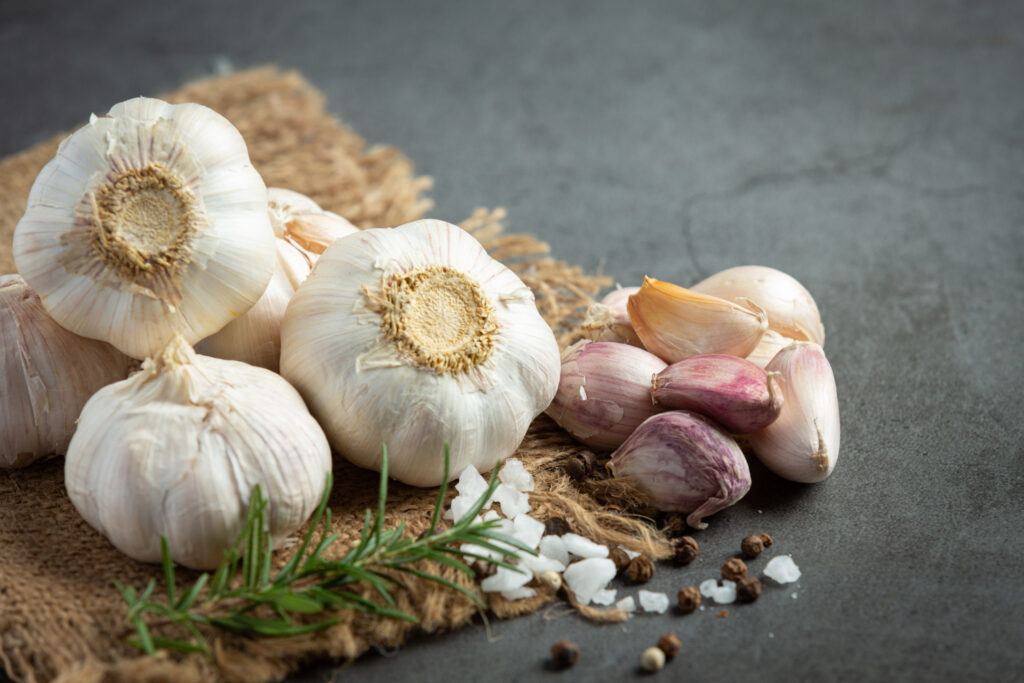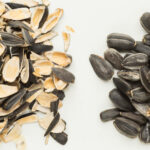
Overview
Garlic, a pungent and flavorful ingredient used in many cuisines around the world, is more than just a spice for cooking. This ancient plant has been valued for its medicinal properties for thousands of years. From ancient Egyptian healers to modern health enthusiasts, garlic has long been recognized for its health-promoting properties, especially when it comes to strengthening the immune system. In this blog post, we will explore the science-backed health benefits of garlic, how it can support your immune health, and ways to incorporate it into your diet for maximum benefit.
How Garlic Enhances Immune Function
Garlic’s reputation as an immune booster comes from its unique chemical compounds, primarily allicin, which is released when garlic is crushed or chewed. This compound has powerful antimicrobial and antioxidant properties, making garlic an effective natural remedy for fighting infections and supporting overall immune function.
Here are some of the ways garlic supports immune health:
- Activates Immune Cells: Garlic compounds stimulate important immune cells, including lymphocytes, macrophages, and T-cells, which help fight off viruses and bacteria.
- Increases Antibody Production: Studies have shown that garlic can enhance the production of immunoglobulins, which are crucial for identifying and neutralizing pathogens in the body.
- Boosts Natural Killer Cells: Garlic has been shown to increase the activity of natural killer (NK) cells, which are part of the body’s first line of defense against infections.
Garlic’s Role in Reducing Inflammation and Improving Circulation
One of the lesser-known benefits of garlic is its ability to improve blood circulation, which plays an important role in keeping the immune system functioning properly. Healthy blood flow ensures that immune cells can travel freely throughout the body, targeting areas where they are needed most.
Garlic has been found to improve endothelial function, which refers to the health of the inner lining of blood vessels. By promoting better circulation, garlic indirectly supports the immune system by ensuring that immune cells can move efficiently to fight off infections.
Additionally, garlic has natural anti-inflammatory properties, which can reduce chronic inflammation—a common factor in many diseases, including heart disease and diabetes. Inflammation weakens the immune system, so reducing it can help boost your body’s natural defenses.
Garlic and Zinc
Zinc is a vital mineral that plays a key role in maintaining a healthy immune system. It is involved in the production and function of immune cells, including lymphocytes and neutrophils. Garlic has been shown to increase the bioavailability of zinc in the body, meaning that when garlic is consumed alongside zinc, the body is better able to absorb and utilize this important mineral.
In one study, mice fed a combination of garlic polysaccharides and zinc showed improved immune function compared to those that consumed zinc alone. While more research is needed in humans, this suggests that combining garlic with zinc-rich foods or supplements could enhance immune support.
Garlic and Stress Management
Stress is a well-known suppressor of the immune system, making the body more vulnerable to infections. Chronic stress reduces the number of lymphocytes—immune cells that fight off infection—making you more susceptible to illness. Garlic may help in managing stress, indirectly benefiting the immune system.
Animal studies have shown that garlic extract can reduce stress hormone levels and increase antioxidant activity in the brain. While these studies are not conclusive in humans, they suggest that garlic may have a role in stress management, thereby supporting immune health
Nutritional Facts of Garlic
Garlic is not just known for its medicinal benefits; it’s also packed with essential nutrients that contribute to your overall health. Although garlic is typically consumed in small quantities, its nutrient profile is impressive for such a modest ingredient.
Here’s a breakdown of the nutritional content in 1 ounce (28 grams) of garlic:
- Calories: 42
- Carbohydrates: 9 grams
- Protein: 1.8 grams
- Fiber: 0.6 grams
- Fat: 0.1 grams
- Vitamin C: 15% of the Recommended Daily Allowance (RDA)
- Vitamin B6: 17% of the RDA
- Manganese: 23% of the RDA
- Selenium: 6% of the RDA
- Calcium: 5% of the RDA
- Copper: 6% of the RDA
- Phosphorus: 6% of the RDA
- Iron: 1.7% of the RDA
Nutritional Benefits
- Low in Calories: Garlic is very low in calories, making it a guilt-free addition to your meals.
- Rich in Vitamin C: This vitamin is crucial for immune health, wound healing, and skin protection from oxidative damage.
- High in Vitamin B6: Vitamin B6 supports brain health, reduces symptoms of depression, and improves mood.
- Manganese: Important for bone health, metabolism, and nutrient absorption.
- Antioxidant-Rich: Garlic contains antioxidants like flavonoids, which help fight oxidative stress and inflammation in the body.
Including garlic in your diet offers not only medicinal benefits but also important nutrients that support various bodily functions. Whether you add garlic to soups, salads, or main courses, you’ll be nourishing your body with these essential vitamins and minerals.
Best Ways to Add Garlic to Your Diet
There are many ways to incorporate garlic into your diet, but not all methods are equally beneficial when it comes to maximizing its health effects. Here are some tips on how to get the most out of garlic:
- Eat Raw Garlic: For the best immune-boosting effects, eating raw garlic is recommended. Crush or chop garlic and let it sit for a few minutes to activate the allicin before eating. You can add it to salads, dips, or even mix it with honey for a potent immune tonic.
- Cooked Garlic: Cooking garlic does reduce the allicin content, but it still retains some health benefits. Add it to soups, stews, and stir-fries for a delicious flavor and mild immune support.
- Garlic Supplements: If you don’t like the taste of raw garlic or have trouble incorporating it into your meals, garlic supplements are an option. Look for supplements that specify the allicin content to ensure you’re getting an effective dose.
- Garlic Oil: Garlic-infused oil is another great way to enjoy the health benefits of garlic while adding a rich flavor to your dishes.
Potential Side Effects of Garlic
While garlic is generally safe for most people, it’s important to be aware of potential side effects, especially if consumed in large quantities:
- Digestive Issues: Some people may experience heartburn, gas, or stomach upset from eating raw garlic.
- Bad Breath and Body Odor: Garlic’s sulfur compounds can cause unpleasant breath and body odor, which can linger even after brushing your teeth.
- Allergic Reactions: Although rare, some individuals may be allergic to garlic. Symptoms of an allergy can include skin rash, digestive discomfort, and in severe cases, anaphylaxis.
- Increased Bleeding Risk: Garlic can act as a blood thinner, so people who take anticoagulant medications or are scheduled for surgery should consult a doctor before significantly increasing their garlic intake.
Other Health Benefits of Garlic
Aside from its immune-boosting properties, garlic offers a wide range of health benefits that make it a valuable addition to any diet:
- Heart Health: Garlic can help lower blood pressure and cholesterol levels, promoting cardiovascular health.
- Antioxidant Properties: The antioxidants in garlic help protect cells from oxidative stress, which contributes to aging and many chronic diseases.
- Antibacterial and Antifungal Effects: Garlic’s antimicrobial properties make it effective in treating bacterial and fungal infections, such as athlete’s foot and candidiasis.
- Supports Gut Health: Garlic acts as a prebiotic, promoting the growth of healthy gut bacteria, which is essential for immune health.
The Takeaway
Garlic is much more than a flavorful addition to your meals—it’s a powerful natural remedy with a wide range of health benefits. From boosting your immune system to improving circulation and reducing inflammation, garlic can play a key role in promoting overall health and wellness.
To reap the full benefits of garlic, try incorporating it into your daily diet in its raw form or through supplements. While more research is needed to fully understand its effects on the immune system, the evidence so far suggests that garlic is a valuable addition to any health-conscious individual’s regimen.
As always, if you have underlying health conditions or are taking medications, consult with your healthcare provider before making significant changes to your diet. With its potent properties and wide-reaching benefits, garlic truly lives up to its reputation as a natural health booster
Frequently Asked Questions
How does garlic boost the immune system?
Garlic contains compounds like allicin and polysaccharides, which have been shown to improve immune cell activity. It enhances the function of various immune cells, such as T-cells, lymphocytes, and immunoglobulins, helping the body better fight off infections and diseases.
Can garlic prevent the common cold or flu?
Studies suggest that garlic can help reduce the risk of catching a cold or the flu, and it may also shorten the duration and lessen the severity of symptoms. However, more research is needed to determine its long-term effectiveness as a preventive measure.
Are there any side effects of consuming garlic?
Garlic is generally safe when consumed in normal amounts, but excessive intake can lead to side effects such as bad breath, stomach upset, and increased risk of bleeding. It may also interact with certain medications like blood thinners or HIV drugs, so it’s important to consult a healthcare provider if you’re on medication.











